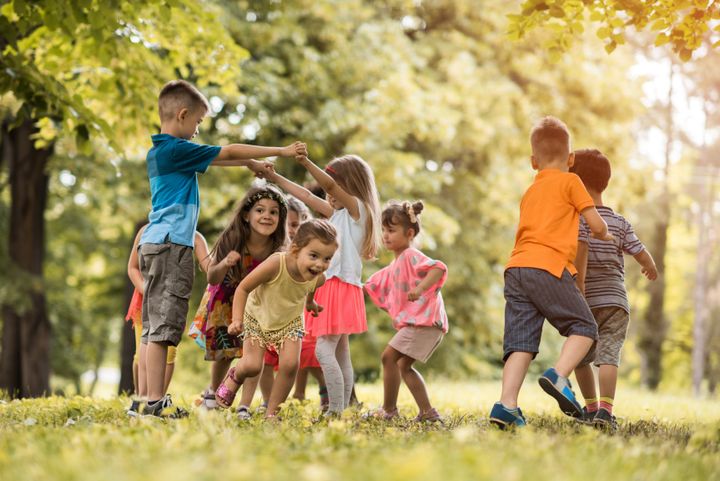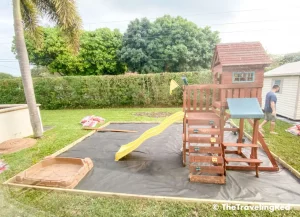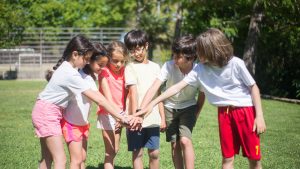Playground games are a staple of childhood, fostering joy, physical activity, and social interaction. These games are more than just fun; they help children develop important skills and build lifelong memories. Let’s explore some of the best playground games that children can enjoy.
Classic Playground Games
Tag Tag is a timeless playground game that involves one person chasing others to “tag” them and make them “it.” Variations of Tag include Freeze Tag, where tagged players must freeze until another player unfreezes them, and Shadow Tag, where players tag each other’s shadows.
Hide and Seek This game requires one child to count with their eyes closed while others hide. The seeker then looks for the hidden players. Hide and Seek enhances problem-solving skills and spatial awareness.
Hopscotch Hopscotch involves drawing a numbered grid on the ground and hopping through it on one foot. It’s great for developing balance and coordination. Kids can create variations by changing the grid’s design or rules.
Red Rover Red Rover involves two teams holding hands and calling a player from the opposite team to try and break through their chain. This game builds strength and strategy, but it’s important to ensure safety to avoid injuries.
Imaginative Playground Games
Capture the Flag This game divides children into two teams, each with a flag. The goal is to capture the opposing team’s flag and bring it back to your own territory without getting tagged. It’s excellent for teamwork and strategic thinking.
Simon Says In Simon Says, one child gives commands beginning with “Simon says,” and the others must follow only if the command includes that phrase. This game enhances listening skills and attention to detail.
Duck, Duck, Goose Children sit in a circle while one child walks around, tapping heads and saying “duck” until choosing someone as “goose.” The goose then chases the tapper around the circle. This game improves quick reflexes and coordination.
Ball Games
Four Square Four Square involves four players bouncing a ball into each other’s squares. The goal is to make moves that are difficult for others to return. It develops hand-eye coordination and agility.
Kickball Kickball combines elements of baseball and soccer. Players kick a ball and run bases, aiming to score runs. It’s a fantastic way to encourage teamwork and physical activity.
Dodgeball Players on two teams throw balls at each other while avoiding being hit. Variations include team dodgeball and trench dodgeball. Safety is crucial to prevent injuries, so soft balls and clear rules are recommended.
Rope Games
Jump Rope Jump rope can be played individually or in groups. Double Dutch involves two ropes being turned in opposite directions. These activities improve cardiovascular health and coordination.
Tug of War Tug of War is a team game where players pull on opposite ends of a rope. The goal is to drag the opposing team across a center line. It builds strength and teamwork but requires proper supervision to avoid accidents.
Chasing Games
Freeze Tag In Freeze Tag, players must freeze when tagged until another player unfreezes them by tagging them. This game combines elements of chase and strategy, promoting agility and teamwork.
Sharks and Minnows This game has one or more “sharks” trying to tag the “minnows” as they run from one side of the play area to the other. It’s a fun way to incorporate speed and strategy into play.
Relay Races
Egg and Spoon Race Players balance an egg (or small ball) on a spoon while racing to the finish line. This game teaches balance and concentration.
Sack Race Participants hop to the finish line while standing in large sacks. It’s a fun, challenging race that improves balance and coordination.
Creative Movement Games
Follow the Leader One child leads others in a series of movements or actions. This game encourages creativity and helps children learn to follow directions.
Musical Chairs Players walk around a circle of chairs while music plays. When the music stops, they must find a chair to sit in. This game is great for developing quick thinking and reflexes.
Social and Cooperative Games
Parachute Games Using a large parachute, children can play various games like making waves, bouncing balls on top, or running underneath. These activities foster cooperation and coordination.
Human Knot Players stand in a circle, grab hands with different people, and try to untangle themselves without letting go. This game enhances problem-solving skills and teamwork.
Quiet Games
Red Light, Green Light One player acts as the traffic light, turning their back and saying “green light” to signal players to move and “red light” to stop. Players must freeze when “red light” is called. This game improves focus and control.
Statues Children must hold a pose without moving. It’s a great way to teach stillness and self-control, providing a calm but fun challenge.
Inclusive Games
Games like Simon Says and Parachute Games can be easily adapted to include children with different abilities. It’s important to choose games that allow every child to participate and enjoy.
Games for Different Age Groups
For Toddlers Simple games like Follow the Leader and basic Tag are perfect for younger children, helping them develop basic motor skills and social interaction.
For Older Children More complex games like Capture the Flag and Dodgeball challenge older children physically and mentally, keeping them engaged and active.
Safety Considerations
Supervision is key to ensuring that children play safely. It’s also important to use appropriate safety gear, such as helmets for certain activities, and to set clear rules to prevent accidents.
Benefits of Playground Games
Physical Health Playground games boost cardiovascular health, strength, and coordination, helping children stay fit and healthy.
Social Skills These games teach teamwork, communication, and conflict resolution, essential skills for social development.
Cognitive Development Games like Simon Says and Capture the Flag enhance cognitive skills, such as problem-solving, strategic thinking, and attention to detail.
Conclusion
Playground games are more than just fun; they are a vital part of a child’s development. Encouraging children to engage in these activities helps them build essential physical, social, and cognitive skills, making outdoor play a crucial aspect of childhood.



